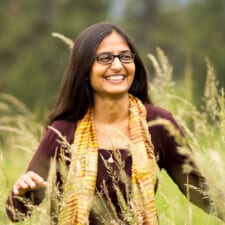Session Resources
Session Leaders

Kritee (dharma name Kanko), is a Buddhist Zen teacher, climate scientist, grief ritual leader, and social permaculture designer. She is cofounder of Boundless in Motion Sangha, a meditation community in the Buddhist lineage of Cold Mountain Zen. She is also a founding board member of Rocky Mountain Ecodharma Retreat Center, a center that brings meditation in nature together with dharma teachings for ecological action as well Frontline Farming, an advocacy group that lifts up people of color and women farmers and focuses on food cultivation, education, policy change and justice. As a senior scientist in the Climate Smart Agriculture Program at Environmental Defense Fund, she is helping to implement environment and climate-friendly methods of small farming at large scales in Asia with a three-fold goal of poverty alleviation, food security and climate mitigation / adaptation.
Opening the Space
We invite you to open your engagement with each session (or group gathering, if applicable) by practicing a Living Earth Acknowledgment. A Living Earth Acknowledgement can nourish our relatedness and avail us to truths beyond domination. Incorporating our ecological nature as well as the calls of justice, it is an exploration, not a formula, to recognize and remember. Through practices like this, we are setting the conditions for shifting minds that are conditioned by domination into more skillful ways of seeing, speaking and acting.
Living Earth Acknowledgment and Prayer
Meditation is an integral part of the EcoSattva journey. If you do not have a meditation practice, now is the perfect time to start. We invite beginners and seasoned practitioners alike to view this guided meditation grounded in our relationship with Earth, created especially for EcoSattva Training participants by our guiding teacher Catherine McGee.
Dharma Offerings
To view the video in full screen, click the expand button ![]() on the lower right.
on the lower right.
Core Offering 1
Kritee Kanko, in conversation with Kristin, presents the first core Dharma offering for this session.
Core Offering 2
Invoking the teachings of Dr. Renée Lertzman (see the supplementary resources below), Kristin invites us to question our projections and build our understanding of how trauma informs our response to ecological crises.
Inquiries
We offer here a set of inquiries and group practices that support this step in our journey. Consider these suggestions and feel free to customize, replace and augment. But we strongly suggest that you explore at least one inquiry with each session.
Below are this session’s inquiry questions in bold, followed by a short commentary. We invite you to gently hold these questions. If this form of exploration is new to you or you would like a refresher, you can learn more about inquiry practice here.
- How am I experiencing ecological distress?
With as much gentleness as possible, can you be curious about where and how you hold the impacts of ecological harm? What issues feel most alive to you? What happens when your distress gets triggered or activated? What resources do you find helpful in metabolizing or composting your ecological distress? - What are some of the stories I tell about what’s going on for others in regard to ecological crises?
When you think of the ways that friends, strangers, or public figures respond (or fail to respond) to our ecological situation, what do you think is going on for them? Be mindful of these opinions. What impact do they have on your mind, heart and body? What purpose might they serve for you? What’s it like to bring some spaciousness to them and allow for other possibilities? - What’s it like to relax my strongly held opinions about this crisis?
At this point in the training, it can be helpful to purposely make space for uncertainty. What happens in your body, heart, and mind when you loosen your sense of certainty about where we’re headed, what we’re doing or not doing, what it should all look like?
Format for group inquiry: Liberating Structures is an excellent resource and we especially like 1-2-4-all and Conversation Café.
Supplemental Resources (Optional)
Seeing How We See
In this video, David Loy explores the role meditation can play in helping us see the world as it is, instead of through the lens of objectification.
The Unprocessed Mourning of Ecological Loss
Dr. Renée Lertzman speaks with Kristin on the unique psychological challenge of our ecological situation and offers us tools to bring compassion to ourselves and others.
Additional Resources
- Video: Referenced in David Loy’s offering, Paul Hawken, environmentalist and entrepreneur, describes humanity’s immune response to political corruption, economic disease and ecological degradation.
- Video: Watch Dr. Lertzman’s TED Talk, How to turn climate anxiety into action
- Paper: Climate Trauma: Toward a New Taxonomy of Trauma, by Zhiwa Woodbury, Department of East-West Psychology, California Institute
of Integral Studies, San Francisco, California. - Book: Environmental Melancholia by Renee Lertzman
- Book: “Language is the starting point for the movement towards self-warmth.” Your Resonant Self, Sara Peyton